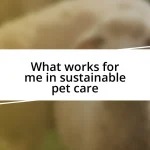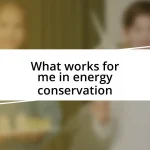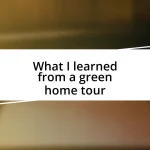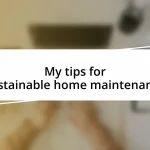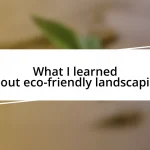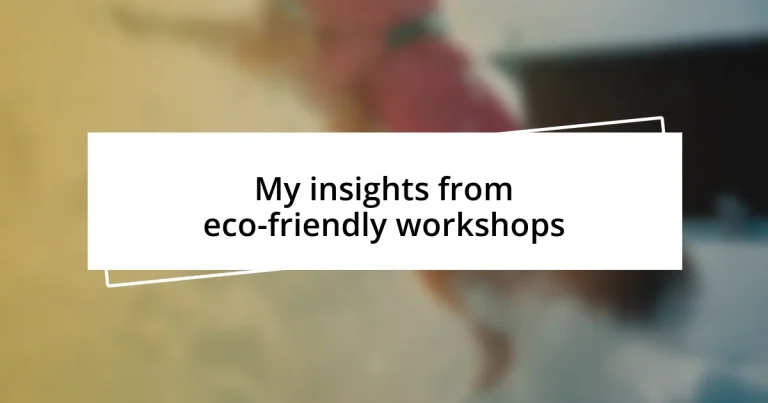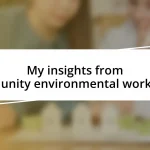Key takeaways:
- Eco-friendly workshops promote sustainability through hands-on experiences, fostering creativity and community engagement.
- Participants gain practical skills, increased awareness, and a sense of empowerment, enhancing their journey toward sustainable living.
- Implementing eco-friendly practices at home, such as using reusable items and growing indoor herbs, can lead to significant positive lifestyle changes.
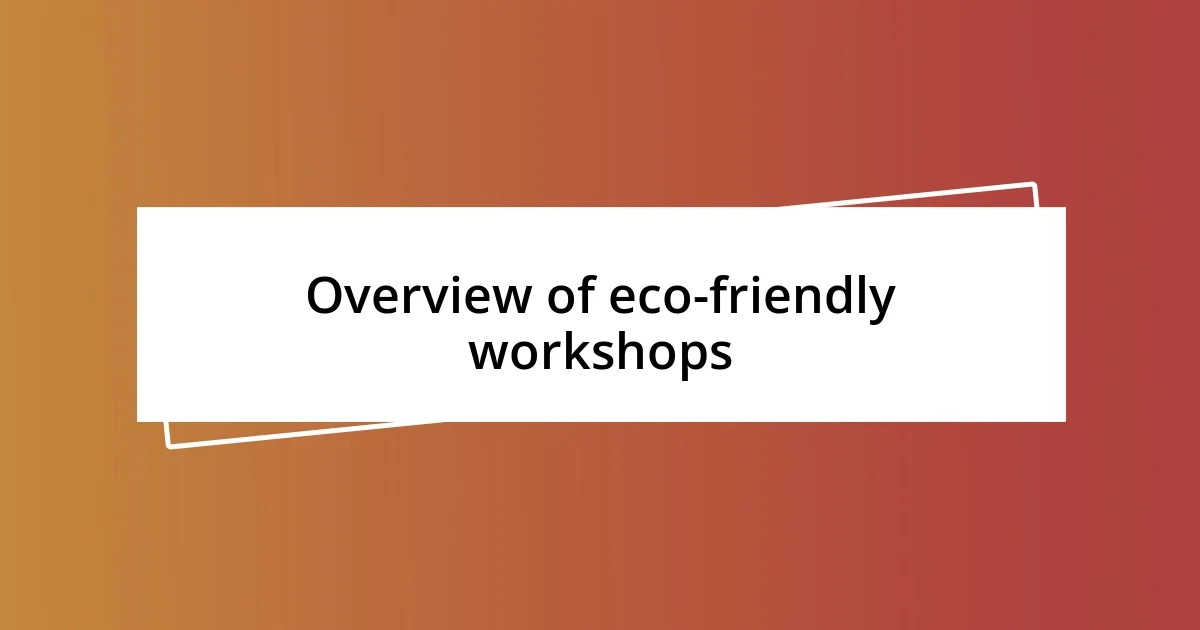
Overview of eco-friendly workshops
Eco-friendly workshops have become a vital platform for promoting sustainability and environmentally conscious practices. I remember attending one that focused on upcycling materials—turning old items into something new and useful. It was inspiring to see how creativity can breathe life into things that would otherwise end up in the landfill.
These workshops often offer hands-on experiences, allowing participants to connect with the concepts on a personal level. For instance, while learning to make natural cleaning products, I was struck by how empowering it felt to create something safe and effective with my own hands. Have you ever experienced that “aha!” moment when you realize that sustainability can be both practical and enjoyable?
Additionally, they foster a sense of community among like-minded individuals. In one such workshop, we shared our challenges and successes in living eco-friendly lives, and it was heartwarming to see the camaraderie that developed. Isn’t it amazing how learning together can strengthen our resolve to protect the environment?
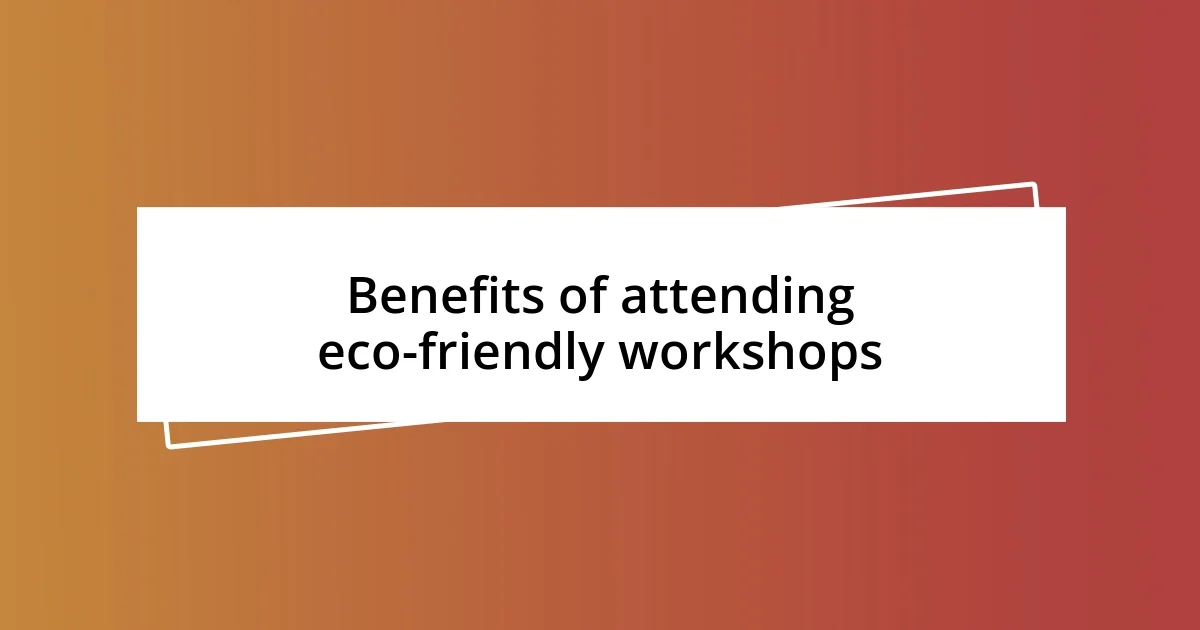
Benefits of attending eco-friendly workshops
Attending eco-friendly workshops offers a myriad of benefits that extend beyond the immediate learning experience. I remember participating in a workshop on composting where not only did I see how easy it was to turn kitchen scraps into nutrient-rich soil, but I also felt an immense sense of connection to nature in that process. It’s fascinating to realize that small changes can lead to significant positive impacts on our environment.
The benefits of attending these workshops include:
- Practical Skills: Learning hands-on skills like gardening or sustainable crafting that you can apply in everyday life.
- Networking Opportunities: Being part of a community that shares your values and interests, which can lead to lasting friendships and collaborations.
- Increased Awareness: Gaining a deeper understanding of environmental issues, empowering you to make informed decisions.
- Inspiration: Discovering innovative ideas and solutions that motivate you to take action and make changes in your life.
- Personal Growth: Experiencing a boost in confidence from acquiring new skills and knowledge that you can apply in various aspects of your life.
It’s not just about the knowledge, but also the feeling of hope and empowerment I experienced, knowing that together with others, we can make a difference. Each workshop has enriched my journey toward sustainability in ways I could have never imagined.
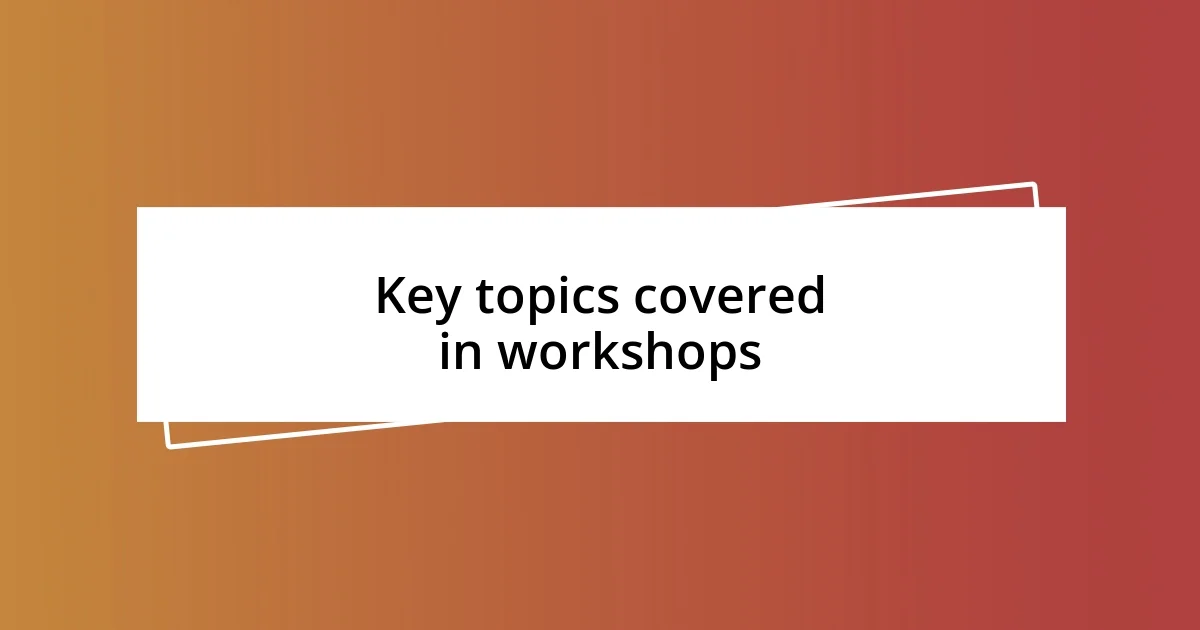
Key topics covered in workshops
The workshops I attended delved into a variety of key topics designed to equip participants with practical knowledge and skills. One memorable session covered zero waste living, exploring strategies to minimize waste in our daily routines. I remember sharing my own trials with eliminating single-use plastics, and it was reassuring to hear others’ stories. We collectively brainstormed creative solutions, and I left feeling energized and motivated.
Another significant area of focus was sustainable food practices. During a workshop that emphasized the importance of locally sourced ingredients, I connected with a farmer who shared their journey. Their passion for organic farming was infectious, and I found myself pondering the impact of my food choices. It’s astounding how learning from real-life experiences can deepen our understanding of sustainability.
To wrap it up, workshops often introduce innovative technologies like vertical gardening and hydroponics. I vividly recall witnessing a demonstration on how to grow herbs indoors without soil—it was like stepping into the future! This blend of traditional practices with modern techniques showcased the exciting possibilities for sustainable living that I hadn’t considered before.
| Workshop Topic | Key Insights |
|---|---|
| Zero Waste Living | Strategies to minimize waste, sharing personal stories |
| Sustainable Food Practices | Importance of locally sourced ingredients, real-life farmer experiences |
| Innovative Technologies | Vertical gardening, hydroponics, blending tradition and modernity |
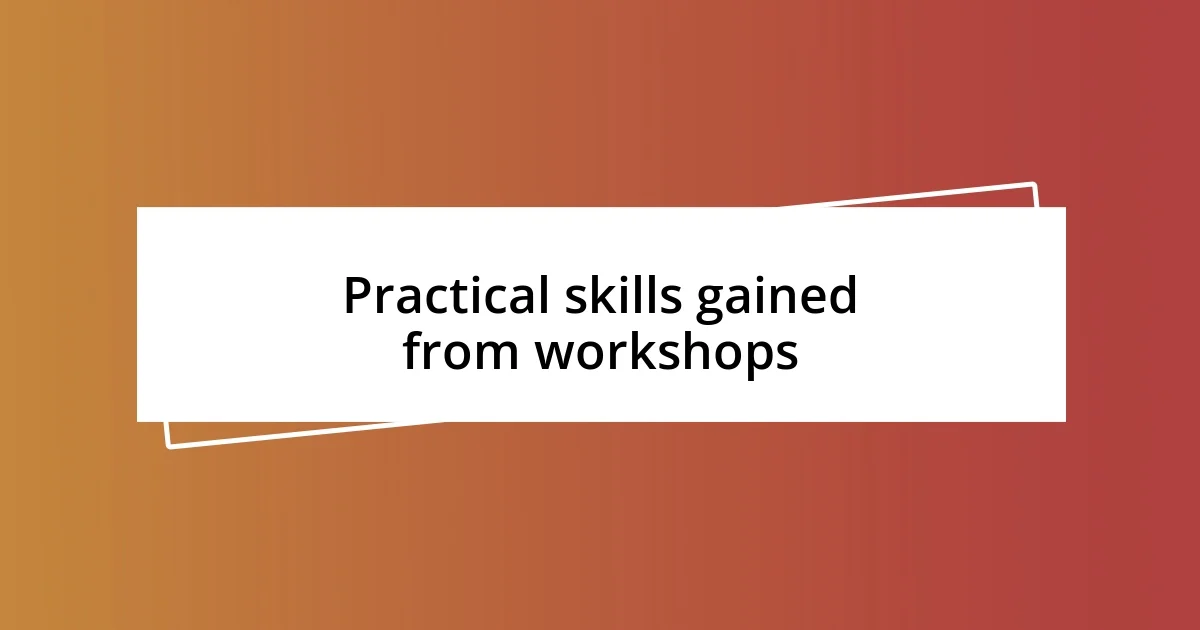
Practical skills gained from workshops
One of the most valuable practical skills I gained from the workshops was the art of natural dyeing. I distinctly remember the excitement of turning ordinary plant materials into vibrant colors for fabric. It was incredible to see colors emerge from items like avocado pits and turmeric. Have you ever considered how nature can be such an artist in our toolkits? The experience deepened my appreciation for the environment and made me eager to experiment with these dyes at home.
I also embraced the craft of upcycling, transforming discarded items into something useful or beautiful. During one workshop, we turned old t-shirts into reusable shopping bags. It was not only about creating something new but also about reducing waste in a fun, hands-on way. Can you imagine the satisfaction of repurposing what would otherwise be trash? This skill has inspired me to look at everyday items with fresh eyes, seeking potential instead of waste.
Lastly, I learned practical gardening techniques, which I had often found intimidating. I remember standing in a community garden, learning about permaculture principles and companion planting. It was a magical moment when I realized I could actually cultivate my own food sustainably! This knowledge transformed how I view gardening; it’s become a source of joy and empowerment. Who knew that connecting with the earth could be so rewarding?
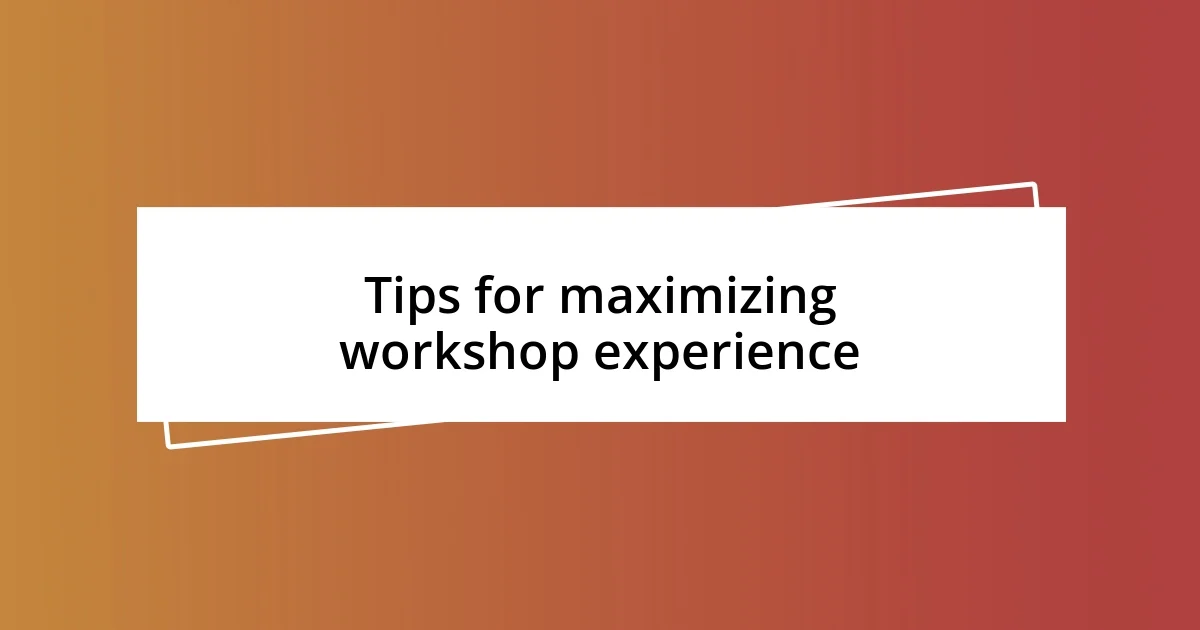
Tips for maximizing workshop experience
To make the most of your workshop experience, I always recommend coming prepared with a curious mindset. Trust me, the more questions you ask, the deeper your understanding will be. I remember attending a session on sustainable living and having my pen racing to keep up with all the insights shared. It was enlightening to explore different viewpoints and practices, something I might have missed had I stayed quiet.
Connecting with fellow participants is equally important. Engaging in conversations before or after the sessions creates a sense of community and shared learning that can amplify the workshop’s value. I vividly recall bonding with a group of like-minded individuals over lunch, where we exchanged personal eco-friendly tips that transformed my daily routine. Have you ever found that these informal discussions often yield the most profound insights?
Finally, don’t hesitate to follow up on what you learned after the workshop ends. Applying the skills and concepts in your life cements that knowledge. I remember diving into a newfound composting practice after a workshop, feeling not only proud but also a little like a pioneer in my neighborhood. It’s like planting a seed—watching it grow is incredibly fulfilling, and it encourages you to keep exploring new practices.
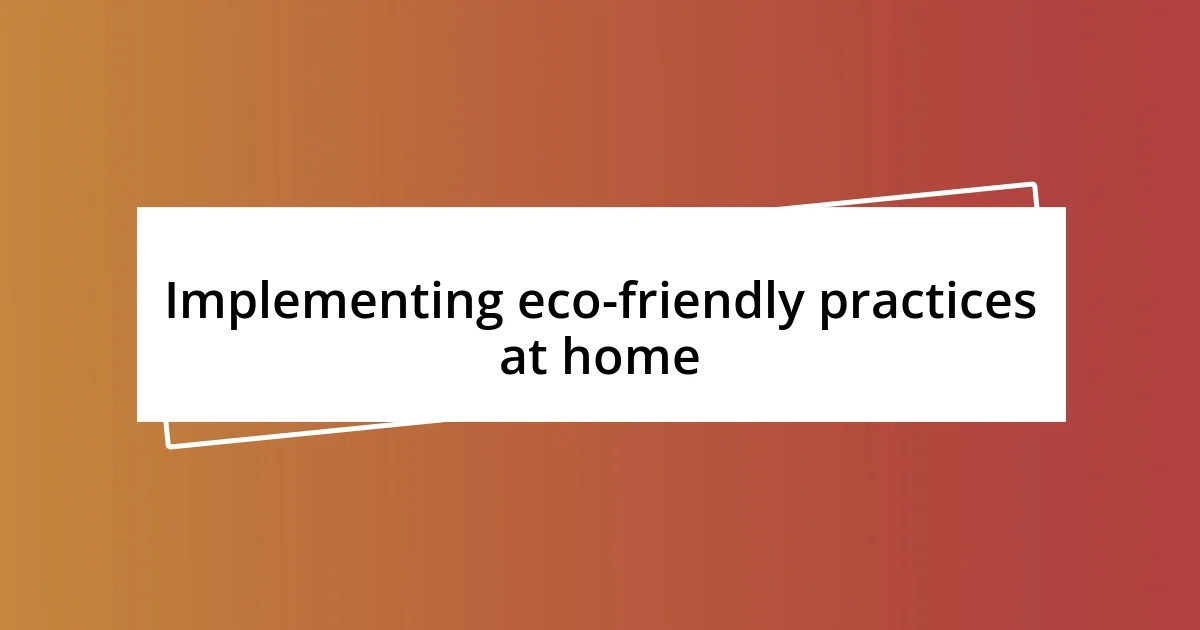
Implementing eco-friendly practices at home
Implementing eco-friendly practices at home can be a transformative journey. For instance, I made the switch to reusable kitchen items, like beeswax wraps instead of plastic wrap. The first time I used them, I felt a rush of satisfaction—it was a small change, but knowing I was reducing plastic waste made a big difference in how I viewed my daily habits.
Another practice I’ve embraced is mindful energy consumption. I remember the moment I switched off my devices at night and felt the stillness in my home. It was a simple, yet profound adjustment, not just saving energy but also creating a more peaceful environment. Have you ever noticed how quiet a room can feel when you unplug for a while? This practice has allowed me to appreciate the small things, like reading a book by candlelight, which feels both cozy and sustainable.
Lastly, I’ve taken steps to create a small indoor herb garden. The pleasure of plucking fresh basil or mint right from my kitchen window is incomparable. It’s amazing how my cooking has transformed—using homegrown herbs brings vibrant flavors and a sense of pride. Plus, it connects me to the cycle of growth and sustainability. Isn’t it fulfilling to think that your meals are nourished by your own hands?


